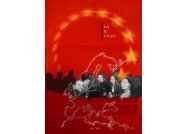turkish-greek civic dialogue - AEGEE Europe
turkish-greek civic dialogue - AEGEE Europe
turkish-greek civic dialogue - AEGEE Europe
Create successful ePaper yourself
Turn your PDF publications into a flip-book with our unique Google optimized e-Paper software.
134<br />
Turkey. An inventory encompassing 8500 Ottoman mansions is available; many<br />
of them are still waiting to be restored.”<br />
Fethiye Mosque in Athens was severely damaged by the latest earthquake and<br />
now it is a place for cats. Athens has 100.000 Muslim population without any<br />
mosque. There should have been at least 600 Muslim maison, whereas only 3<br />
exist. Currently there is a movie theatre inside the mosque in Naflio. Another<br />
mosque was converted into brothel, but since the military force nearby was<br />
dismissed it was also closed down. The situation in Northern Greece and<br />
Dodecanese Islands is much better, since the Turks moved out relatively at a<br />
later period from that particular area the buildings have still been in use.<br />
According to the study conducted by Mutzopulos, 6340 churches are recorded<br />
in Turkey. The starring building such as the Hagia Sofia – Aya Sofya are very well<br />
cared, whereas small and isolated churches do not receive the same treatment.<br />
Monuments are also becoming the victims of racism. In fact, both countries<br />
do have sufficient financial resources to totally renovate this entire cultural<br />
heritage. However ethnic cleansing is also practised on monuments.<br />
The Croatians bombed only the Mostar Bridge while there were thousands of<br />
other bridges only because it was a Muslim bridge.<br />
Zeynep Ahunbay told us about the restoration studies on the Girls’ Monastery<br />
around Trabzon and gave a picture on the destruction and damage. Even<br />
though the project got into the implementation phase, due to a change in<br />
the local government, the project couldn’t be completed. Ali Cengizkan came<br />
across with the plans and drawings of some houses and villages built after<br />
the population exchange as he was researching the housing policies of Turkish<br />
Republic after the 1999 earthquake. Since these plans were very similar to<br />
other housings built previously in Ottoman times, he noticed the continuity<br />
from the Ottomans to the Turkish Republic. He told us that all the documents<br />
regarding population exchange, development and settlement proxy that is<br />
currently kept by Land and Settlement General Directorate is to be disclosed<br />
for public information in 2-3 years.<br />
Sacit Pekak said that the families in Cappadoccia region were not willing to<br />
assist with the identification of house-churches with the fear that Ministry<br />
of Culture would confiscate their houses. However, there are many domestic<br />
chapels within these houses. Filiz Yenişehirlioğlu shared her memories from<br />
their trip to Greece, as they were visiting the settlements built for emigrants.<br />
She was looking for the traces of influence from Anatolian structures. In some<br />
houses, windows and doors resemble these traces. In many of the settlements<br />
there are fountains at squares which is common culture and a big reflection<br />
from Anatolia.<br />
MINORITY-“MILLET” CULTURE<br />
BEFORE & AFTER “LAUSANNE”<br />
The second day of the conference was also dedicated to the theme of Minorities<br />
and Millet “Nation” Culture. One of the Greek speaker was mistaken to claim<br />
that the roots of the word “mübadil”- emigrant is Arabic which means “price to<br />
be paid”. Renée Hirschon, as an expert on the subject, corrected by referring<br />
to her recent book.<br />
Kostas Tsitselikis pointed out some very interesting arguments in his speech.<br />
“Venizelos claimed in one of his speeches in 1906 that Greece would very<br />
soon become a Muslim power, with the assumption that he would occupy the<br />
whole Anatolia. He would be right in his statement, if we consider the Muslim<br />
community under the occupied areas and in Greece at those days. However<br />
his dreams of Muslim majority under the control of Greek minority failed very<br />
sadly”.<br />
“Through the exchange of populations a solution has been suggested for the<br />
first time in history within the framework of international law; as we all<br />
know, Albanians were left out of the exchange context. 9000 Muslims living in<br />
Dodecanese became Greek citizens”<br />
“Millet system is still ongoing in both sides. In Western Thrace, provisions of<br />
Islamic law are in practice in daily life; however, in Turkey the authorities of<br />
the Patriarch are restricted. Secular Turkey supports the provisions of Islamic<br />
law in Western Thrace for the sake of supporting the community itself. A<br />
strange dilemma”<br />
Giorgos Mavrommatis also contributed in the panel discussions with expressing<br />
his views about the emigrants.<br />
Population Exchange Association des Etats Généraux des Etudiants de L’<strong>Europe</strong>







